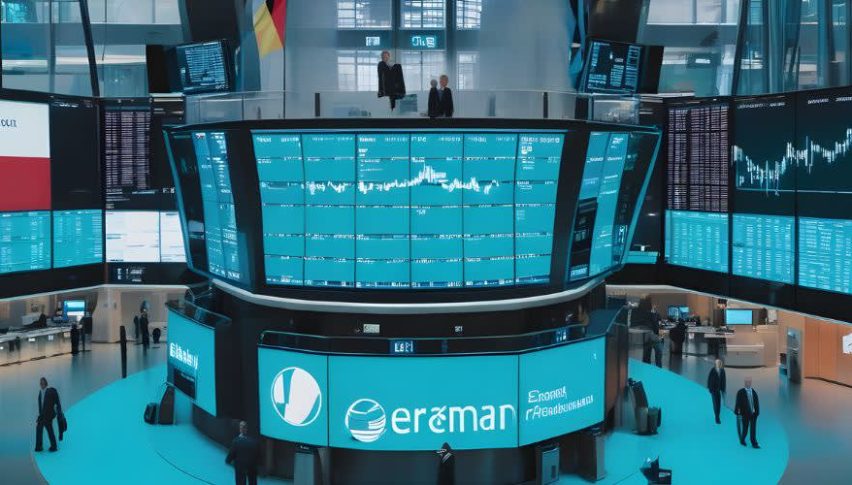The benchmark STOXX 600 has recovered more than half of its losses after plunging nearly 18% from its record highs earlier this month.
Ignacio Teson•Thursday, April 24, 2025•2 min read

Quick overview
- European markets are experiencing caution due to mixed corporate earnings and uncertainty surrounding U.S.-China trade relations.
- Wall Street shows mixed performance, with the Nasdaq up slightly while the Dow Jones falls due to a significant drop in IBM shares.
- China has dismissed reports of trade talks with the U.S., contradicting President Trump’s recent comments about a potential de-escalation.
- The European Central Bank has cut its deposit rate to support the economy, with expectations for further rate cuts to restore investor confidence.
In a climate of global uncertainty, European markets are reflecting investor caution, weighed down by mixed corporate earnings and conflicting signals from U.S. trade policy.

On Wall Street, major indexes show a mixed performance. The broader market is trading slightly higher, with the Nasdaq Composite up 0.4%. Meanwhile, the Dow Jones Industrial Average lags behind, falling 189 points—or 0.5%—dragged down by an 8% slump in IBM shares.
SPX
Tensions flared overnight as China declared that no trade talks are currently underway with the U.S. Ministry of Commerce spokesperson He Yadong dismissed all reports of progress, calling for the removal of “unilateral tariffs.” This directly contradicted comments from President Donald Trump, who recently expressed a willingness to take a less confrontational approach with Beijing.
Treasury Secretary Scott Bessent echoed this softer tone on Wednesday, stating the U.S. has “a chance to strike a great deal” on trade. Currently, Chinese imports face U.S. tariffs of up to 145%.
While this shift in rhetoric from Washington is somewhat encouraging, markets remain range-bound. Investors are looking for concrete actions—either tariff rollbacks or meaningful trade agreements—to fuel sustained optimism. Analysts warn that ongoing corrections could take months to resolve, especially given the sharpness of recent declines.
European Markets Struggle for Direction
European markets fell on Thursday as investors processed mixed earnings reports and remained cautious amid the evolving U.S.-China trade narrative.
Wall Street futures point to another volatile session. Following a strong rally on Wednesday, U.S. indices are giving back some gains: the Dow Jones is down 112 points (-0.3%), the S&P 500 slips 0.1%, and the Nasdaq 100 edges down 0.1%.
Europe’s STOXX 600 index was down 0.7% as of 08:04 GMT, with regional indices in Germany, France, Spain, and the UK declining between 0.3% and 0.9%.
Markets remain jittery following President Trump’s recent verbal attack on Federal Reserve Chair Jerome Powell—an attack he later walked back. Wednesday’s rebound in European and U.S. stocks was fueled by signs from the White House of a desire to de-escalate trade tensions, supported by Secretary Bessent’s acknowledgment that high tariffs are unsustainable.
Still, the rally appears fragile. “There’s little clarity from China, and market moves seem driven more by Trump’s comments than by concrete developments,” said one analyst. “That’s why we’re seeing a pullback this morning after yesterday’s fragile optimism.”
Luxury stocks led sector losses in Europe, falling 1.8%, followed by technology shares, which dropped 1.4%.
The benchmark STOXX 600 has recovered more than half of its losses after plunging nearly 18% from its record highs earlier this month, a drop fueled by fears of a global recession triggered by U.S. tariffs.
The European Central Bank (ECB) cut its deposit rate by 25 basis points last week in a move to support a weakening economy. Markets now expect at least two more rate cuts before year-end. Diverging inflation expectations between the U.S. and Europe could give the ECB room to provide further support. Combined with fiscal stimulus, this may help restore investor confidence later in the year.
Ignacio Teson
Economist and Financial Analyst
Ignacio Teson is an Economist and Financial Analyst. He has more than 7 years of experience in emerging markets. He worked as an analyst and market operator at brokerage firms in Argentina and Spain.



















